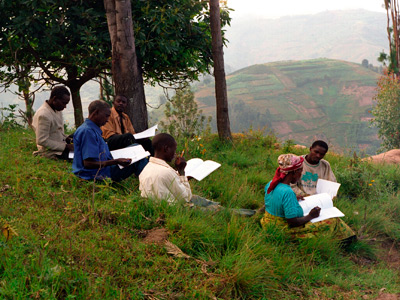
A Bahá'í study circle
© Baha’i Media Bank
Bahá'í Way of Life - The Bahá'í Community’s Contribution to Society
The members of the Bahá'í community around the world are working together with their family, friends, neighbours and co-workers to translate the teachings of Bahá'u'lláh into reality. Engagement in this process takes two forms: developing one's inherent potentialities, and contributing towards the transformation and betterment of society. At the neighbourhood level, Bahá’ís contribute to community building by offering moral and spiritual education for children and young people, as well as devotional gatherings where groups of people can meet in a spiritually uplifting atmosphere. At local, regional and national levels, Bahá’ís are engaged in dialogue with other interested parties on the pressing issues facing society, such as gender equality, religious tolerance and caring for the environment.
Ready for more?
not all...
quizzers. Try to win a coveted spot on our Hall of Fame Page.







